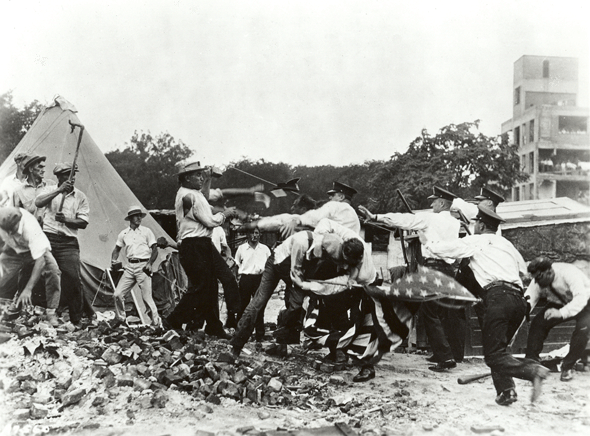
The Bonus Army was the popular name for an assemblage of some 43,000 marchers—17,000 U.S. World War I veterans, their families, and affiliated groups—who gathered in Washington, D.C. in the summer of 1932 to demand cash-payment redemption of their service certificates. Organizers called the demonstrators the "Bonus Expeditionary Force", to echo the name of World War I’s American Expeditionary Forces, while the media referred to them as the "Bonus Army" or "Bonus Marchers". The contingent was led by Walter W. Waters, a former U.S. Army sergeant.
Many of the war veterans had been out of work since the beginning of the Great Depression. The World War Adjusted Compensation Act of 1924 had awarded them bonuses in the form of certificates they could not redeem until 1945. Each service certificate, issued to a qualified veteran soldier, bore a face value equal to the soldier’s promised payment plus compound interest. The principal demand of the Bonus Army was the immediate cash payment of their certificates.
Retired Marine Corps Major General Smedley Butler, one of the most popular military figures of the time, visited their camp to back the effort and encourage them.[1] On July 28, U.S. Attorney GeneralWilliam D. Mitchell ordered the veterans removed from all government property. Washington police met with resistance, shots were fired and two veterans were wounded and later died. President Herbert Hoover then ordered the Army to clear the veterans’ campsite. Army Chief of Staff General Douglas MacArthur commanded the infantry and cavalry supported by six tanks. The Bonus Army marchers with their wives and children were driven out, and their shelters and belongings burned.
A second, smaller Bonus March in 1933 at the start of the Roosevelt administration was defused in May with an offer of jobs with the Civilian Conservation Corps at Fort Hunt, Virginia, which most of the group accepted. Those who chose not to work for the CCC by the May 22 deadline were given transportation home.[2] In 1936, Congress overrode President Franklin D. Roosevelt’s veto and paid the veterans their bonus nine years early.
Cited from: Wikipedia, the free encyclopedia. Read more at: https://en.wikipedia.org/wiki/Bonus_Army
